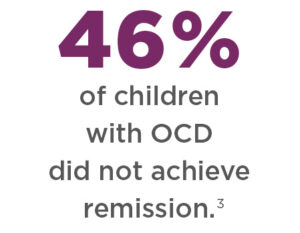Infections and treatment resistant OCD
Obsessive compulsive symptoms are treated primarily with standard medications and psychotherapy. But studies indicate that these medications don’t work for 1 in 3 people with OCD. 1 Other studies report that 40 to 60% of patients with OCD do not show an adequate response to first-line treatments. 2
Patients with treatment resistant OCD can suffer terribly with little relief. “Some people suggest that the level of functioning in someone with treatment resistant OCD is about the level of functioning of a patient with schizophrenia.” 2
Children with treatment resistant OCD
One study found, 46% of children diagnosed with OCD did not achieve a remission. “Children with OCD symptoms that do not respond to evidence-based treatments are among the most challenging and difficult patients with OCD to treat.” 3
Children and adolescents with treatment resistant OCD may suffer from an autoimmune condition known as Pediatric Autoimmune Neuropsychiatric Disorder Associated with Streptococcal infections (PANDAS).
It is unknown why some patients with treatment resistant OCD don’t respond to standard medications. There may be multiple factors at play. However, evidence suggests that, in some cases, infections can induce an autoimmune response, leading to the onset of obsessive-compulsive symptoms.
Could your treatment resistant OCD symptoms be due to an immune dysfunction?

Take Our Quiz
Answer a few questions to find out if you might benefit from testing with the Autoimmune Brain Panel™.

Learn More About Testing
Are you struggling with treatment-resistant OCD? It may be due to an autoimmune response.


Autoimmune induced OCD
New research indicates that some patients with OCD, who do not respond to standard treatment or whose symptoms worsen with these medications, may have a form of autoimmune encephalitis, known as basal ganglia encephalitis, prompting their OCD-like behaviors.
Various infections, including strep, mycoplasma pneumonia and coxsackie virus, can trigger the immune system to produce autoantibodies that mistakenly target a specific region of the brain. When these autoantibodies are directed against the basal ganglia region of the brain, it can cause inflammation in that region and disrupt normal cell functioning. This, in turn, leads to the onset of neuropsychiatric symptoms, including OCD-like behaviors.
Other infections that have been linked with the onset of obsessive-compulsive behaviors include toxoplasmosis, herpes simplex virus, measles, chicken pox, cytomegalovirus, mumps and Borrelia burgdorferi (the bacteria which causes Lyme disease).
References
- Flegr, J. et al. Toxoplasma-infected subjects report an Obsessive-Compulsive Disorder diagnosis more often and score higher in Obsessive-Compulsive Inventory. European Psychiatry. Volume 40, 82-87. https://www.ncbi.nlm.nih.gov/pubmed/27992837
- Hollander, E. Interview: Developing Guidelines for Treatment-Resistant OCD. Medscape. https://www.medscape.org/viewarticle/507104
- Bloch MH, Storch EA. Assessment and management of treatment-refractory obsessive-compulsive disorder in children. J Am Acad Child Adolesc Psychiatry. 2015;54(4):251–262. https://www.ncbi.nlm.nih.gov/pmc/articles/PMC4460245
